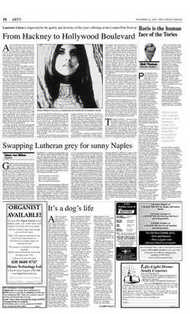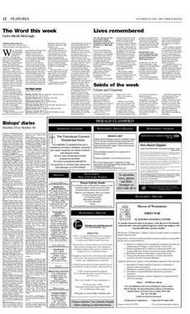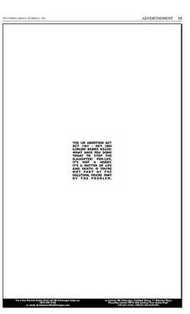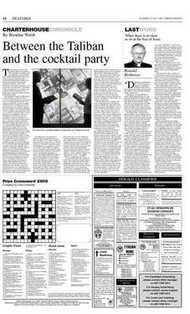Page 5, 22nd October 2004
Page 5

Report an error
Noticed an error on this page?If you've noticed an error in this article please click here to report it.
Tags
Share
Related articles
Nobel Prize For Ireland's Poet
All Books By Two Authors Put On Index
Ec Attacks Pope
Nobel Prize For Ireland's Poet
For Bishop's
Pope May Win Peace Prize The Pope Will Probably Be
Vatican newspaper hits out at Nobel literature prize winner’s ‘lascivious’ books
BY SIMON CALDWELL
THE VATICAN’S newspaper has severely criticised the decision to award this year’s Nobel Prize for Literature to a feminist author whose books are full of graphic accounts of violent sex.
An article in L’Osservatore Romano poured scorn on the works of Elfriede Jelinek, an Austrian poet and novelist, because they linked sex “to pathology, power and violence”.
The book singled out for particular criticism was The Piano Teacher, Ms Jelinek’s best-known work which was turned into a film in 2001 by Austrian director Michael Haneke, starring French actress Isabelle Huppert.
Ms Jelinek used her story about the sexually repressed Erika Kohut, a piano teacher at the Vienna Conservatory, to explore the themes of voyeurism and sadomasochism in a deeply graphic and explicit way.
L’Osservatore Romano said it was little more than “300 pages of brutal recklessness, perverse psychologies and destructive feminine genealogy, intended only to denounce the irremediable inheritance of evil, sin and violence in every form of love”.
It said the novel was marked by “devastating lasciviousness in the name of political and social denunciation, translatable into absolute nihilism”.
The newspaper criticised Ms Jelinek’s other works because “her topics are quickly channelled into descriptions of the feminine world, between scenes of crude sexuality, which are not conducive to an understanding of the emancipation of woman”.
The article said: “Cold and sad, marked by lack of communication and abuse, the union of bodies is never open to the delicacy or dignity of soul or purpose.” Ms Jelinek, 58, the daughter of a Jewish father and a Czech mother, has been a controversial figure in Austria since 1980 when she declared the country “a criminal nation” because of its Nazi past.
A character in her 1990 novel Wonderful, Wonderful Times was a former SS officer who recalled being “up to the ankles of our riding boots in blood in Polish villages” and who made his wife pose for pornographic pictures.
Ms Jelinek said last week that her £800,000 Nobel Prize for Literature, the 10th to go to a woman, was “surprising and a great honour”.
She is, however, not the first Nobel Literature Prize winner to be criticised by the Vatican, but follows in the footsteps of Portuguese novelist and poet Jose Saramago who won the award in 1998.
On the day the Swedish Academy announced him as the winner, L’Osservatore Romano objected to the choice, calling the author an “old-school” Communist with a “substantially antireligious vision”.
Seven years earlier Saramago had published The Gospel According to Jesus Christ, a novel in which Our Lord was depicted as a man who cohabited with Mary Magdalene and tried to avoid crucifixion.
The book caused such an outcry in Portugal that government officials asked for Mr Saramago’s name to be removed from a list of nominees for the European Literary Prize.
He later left his country and set up home in the Canary Islands.
blog comments powered by Disqus















